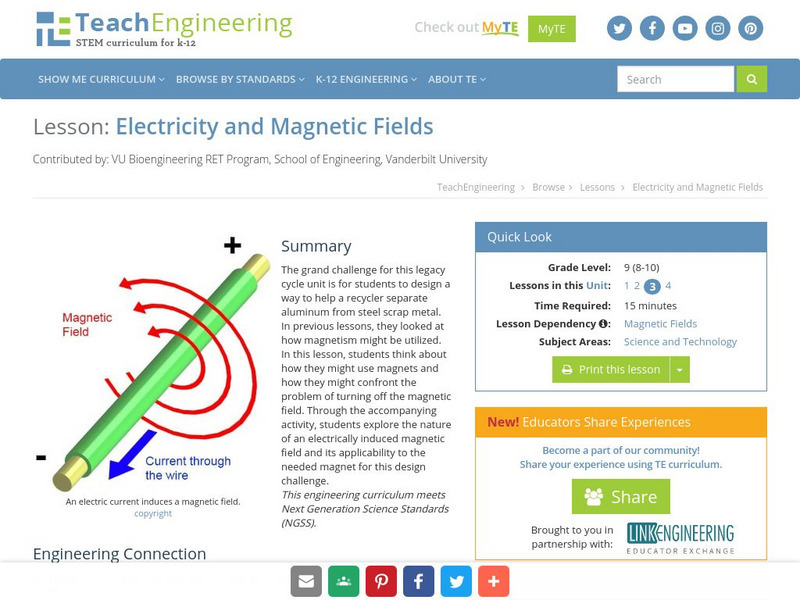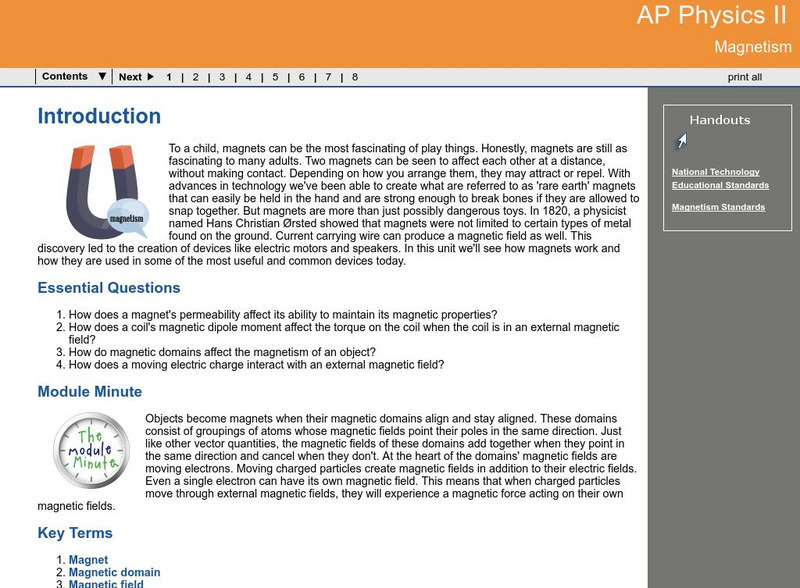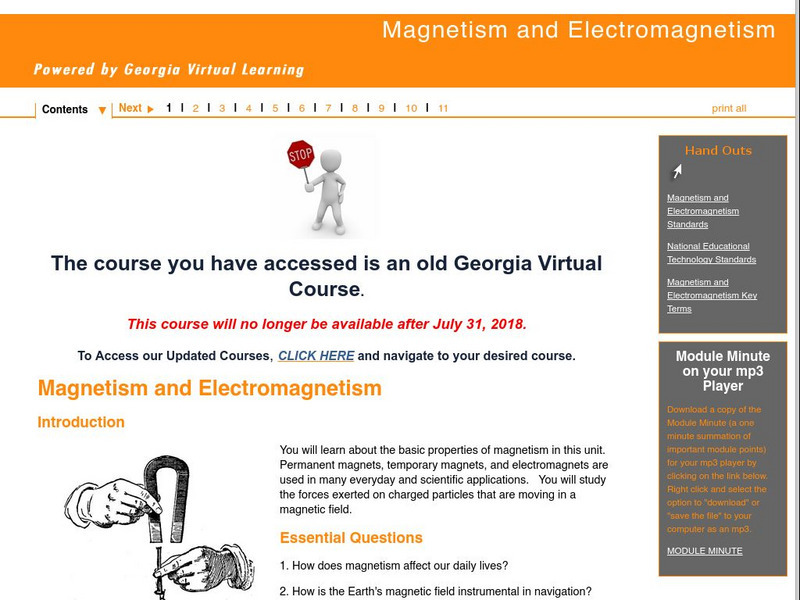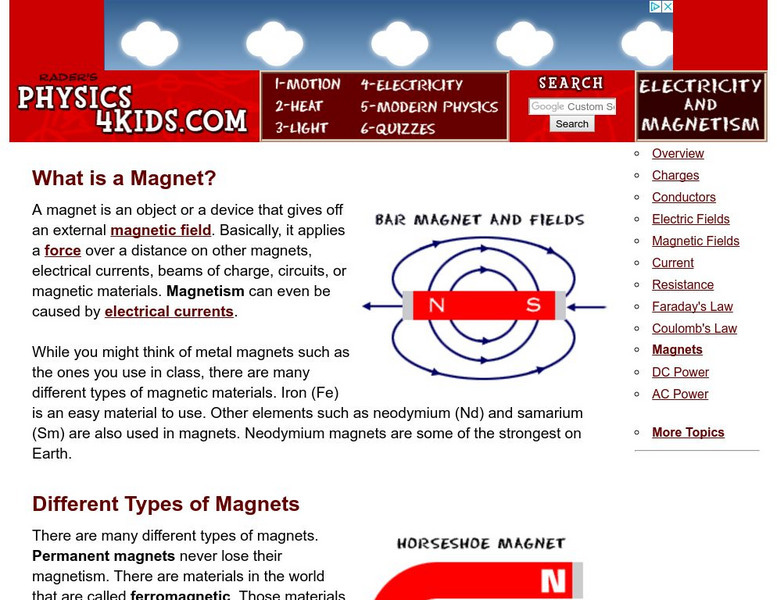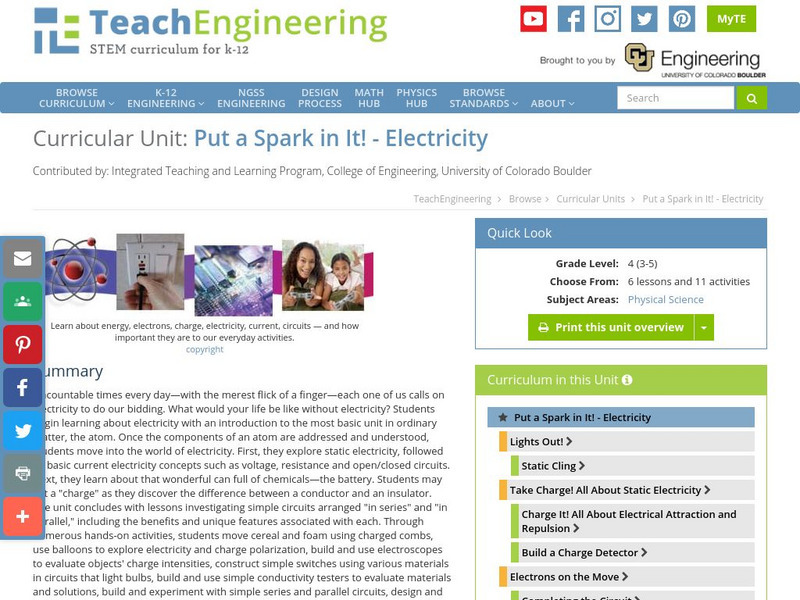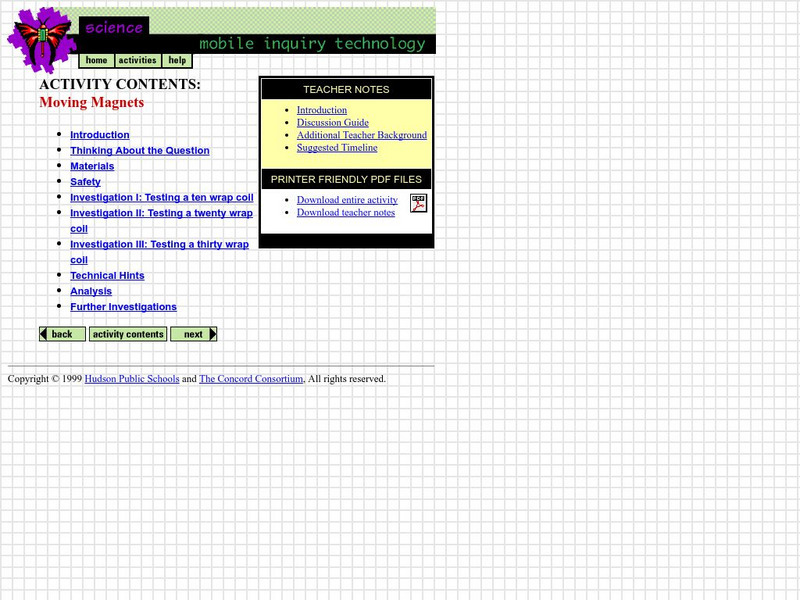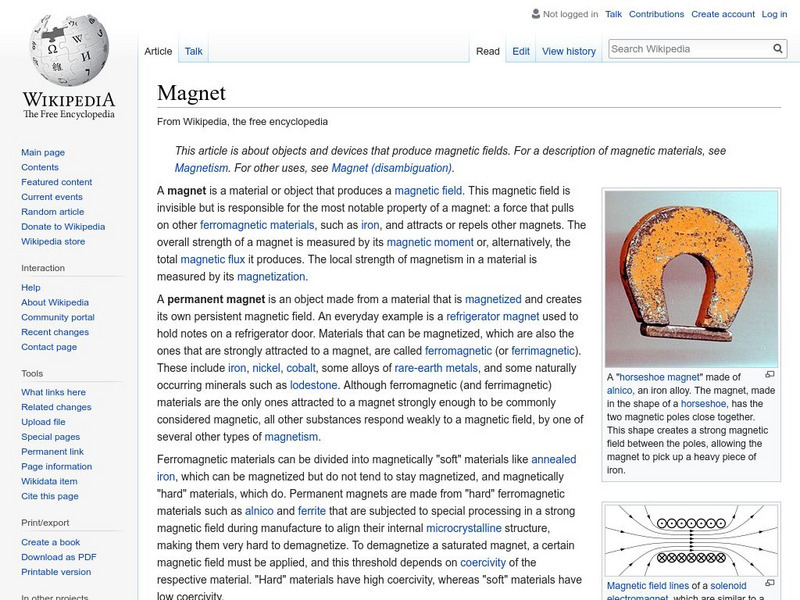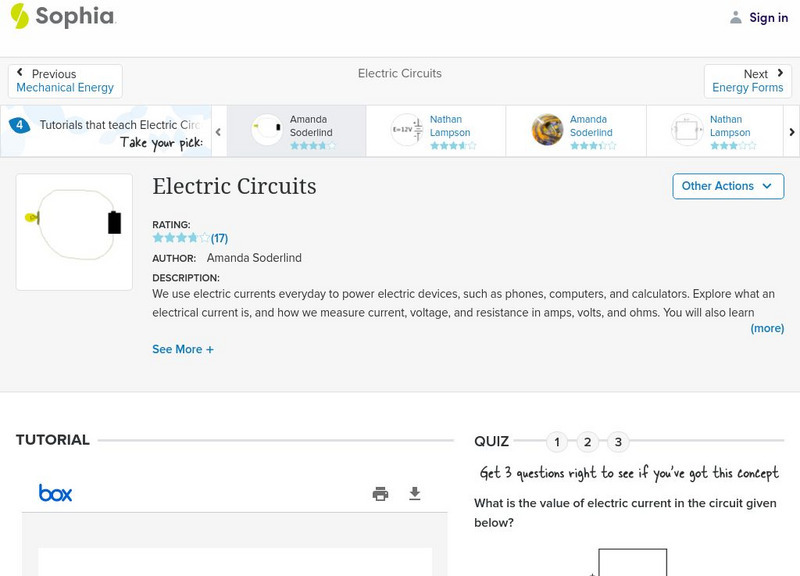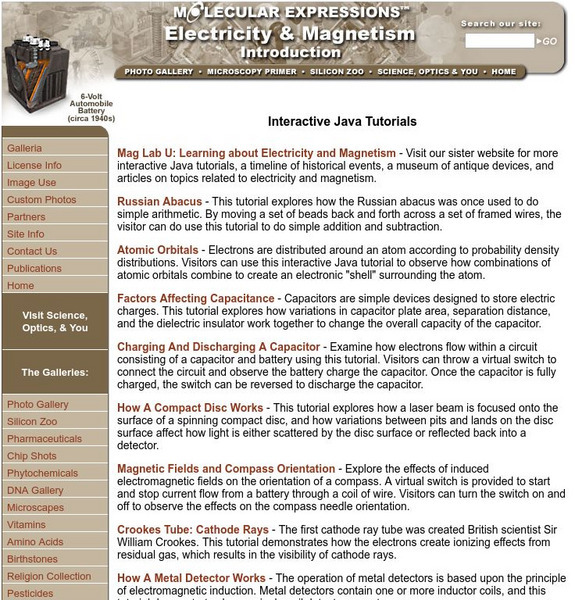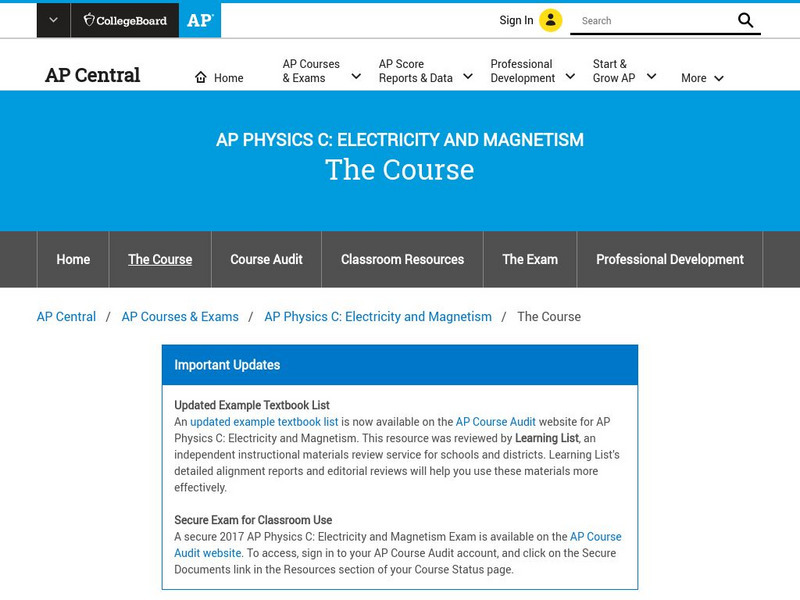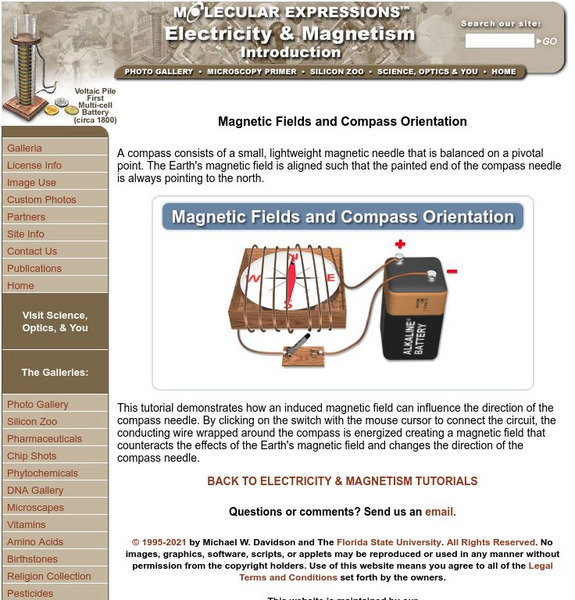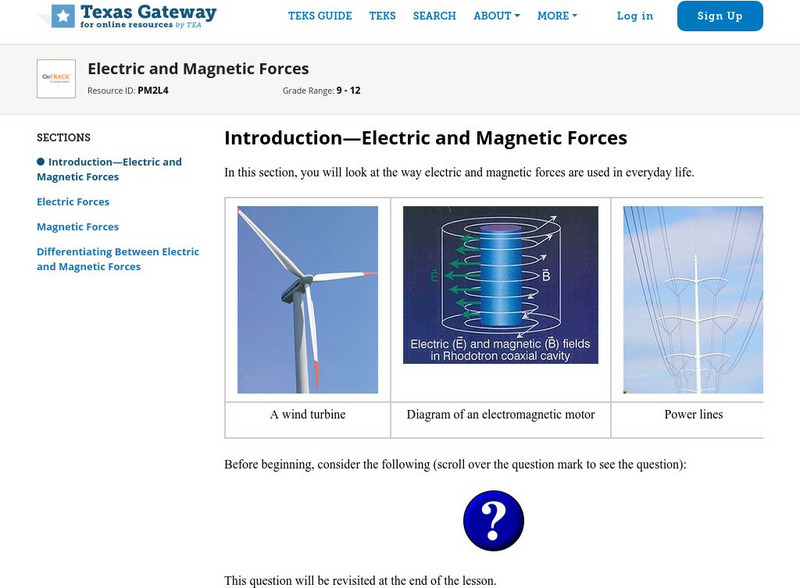TeachEngineering
Teach Engineering: Electricity and Magnetic Fields
The grand challenge for this legacy cycle unit is for students to design a way to help a recycler separate aluminum from steel scrap metal. In previous lessons, they have looked at how magnetism might be utilized. In this lesson,...
Georgia State University
Georgia State University: Hyper Physics: Electricity and Magnetism
HyperPhysics is an exploration environment for concepts in physics by Georgia State University which employs concept maps and other linking strategies to facilitate smooth navigation. This section focuses on electricity and magnetism.
Georgia Department of Education
Ga Virtual Learning: Magnetism
In this interactive unit students will see how magnets work and how they are used in some of the most useful and common devices today.
Science Education Resource Center at Carleton College
Serc: Investigating Magnetism
In this physical science lab, young scholars will investigate ways to control an electromagnet, how adding coils of wire can change the magnet, and the differences between an electromagnet and a bar magnet. Students will explain in their...
Georgia Department of Education
Ga Virtual Learning: Magnetism and Electromagnetism
In this interactive learning module, students learn about the basic properties of magnetism. Practice problems are provided for ongoing assessment.
Physics4kids
Physics4kids: Electricity and Magnetism: Magnets
Here is the site to help you learn all about magnetism and magnets! Find out what a magnet is and how it works. Click for additional details on charges, conductors, magnetic fields, currents, resistance as well as the Laws of Faraday and...
TeachEngineering
Teach Engineering: Drawing Magnetic Fields
Students use a compass and a permanent magnet to trace the magnetic field lines produced by the magnet. By positioning the compass in enough spots around the magnet, the overall magnet field will be evident from the collection of arrows...
TeachEngineering
Teach Engineering: Put a Spark in It! Electricity
Uncountable times every day "with the merest flick of a finger"each one of us calls on electricity to do our bidding. What would your life be like without electricity? Students begin learning about electricity with an introduction to the...
University of Colorado
University of Colorado: Ph Et Interactive Simulations: Electric Field of Dreams
Play ball! Add charges to the Field of Dreams and see how they react to the electric field. Turn on a background electric field and adjust the direction and magnitude. (Kevin Costner not included). Java required.
Florida State University
Florida State University: Magnet Lab: Electric Meter 1872
The invention of the light bulb quickly created the need to track people's electricity usage. In 1872, Samuel Gardiner built the first simple power meter: a lamp with an attached clock that recorded the time the light was on.
National High Magnetic Field Laboratory
Magnet Academy: Timeline of Electricity and Magnetism: 1700 1749
Aided by tools such as static electricity machines and Leyden jars, scientists continue their experiments into the fundamentals of magnetism and electricity.
National High Magnetic Field Laboratory
Magnet Academy: Timeline of Electricity and Magnetism: 1600 1699
The Scientific Revolution takes hold, facilitating the groundbreaking work of luminaries such as William Gilbert, who took the first truly scientific approach to the study of magnetism and electricity and wrote extensively of his findings.
National High Magnetic Field Laboratory
Magnet Academy: Timeline of Electricity and Magnetism: 1880 1889
Nikola Tesla and Thomas Edison duke it out over the best way to transmit electricity and Heinrich Hertz is the first person (unbeknownst to him) to broadcast and receive radio waves.
Concord Consortium
Mobile Inquiry Technology: Moving Magnets
This investigation has students examining how electric and magnetic charges are related. They will look at how an electric current is affected by the proximity of a magnet.
Wikimedia
Wikipedia: Magnet
Wikipedia.com provides an excellent introductory site on magnets. Including basic information describing different types of magnets and their characteristics.
Sophia Learning
Sophia: Electric Circuits: Lesson 3
This lesson will explain how to calculate voltage, current, and resistance in simple electric circuits. It is 3 of 4 in the series titled "Electric Circuits."
Florida State University
Florida State University: Magnet Lab: Molecular Expressions: Electricity & Magnetism Java Tutorials
Molecular Expressions is a comprehensive scientific educational resource that features a considerable collection of interactive Java tutorials relating to electricity and magnetism. Tutorials range in complexity and difficulty of...
National High Magnetic Field Laboratory
Magnet Academy: Simple Electrical Cell
This is a Java tutorial showing the simple voltaic (or galvanic) electrical cell, which is the most basic type of "wet" cell and demonstrates the fundamental chemistry behind batteries.
The College Board
Ap Central: Ap Physics C: Electricity and Magnetism: The Course
CollegeBoard offers a page of resources for students and teachers of AP Physics C: Electricity and Magnetism. Find course and exam information, teaching resources, articles, and recommended links.
National High Magnetic Field Laboratory
Magnet Academy: Roland Eotvos
Vasarosnamenyi Baro Eotvos Lorand, better known as Roland Eotvos or Lorand Eotvos throughout much of the world, was a Hungarian physicist who is most recognized for his extensive experimental work involving gravity, but who also made...
Science Buddies
Science Buddies: Make Your Own Electric Guitar Pickup
If you like playing electric guitar, this could be a cool project for you. In this project you'll wind one or more of your own electric guitar pickups and test them out in an inexpensive electric guitar to understand just how electric...
Florida State University
Florida State University: Molecular Expressions: Magnetic Fields and Compass Orientation
Simulate the creation of an induced magnetic field through the use of a simple electric circuit. An interactive demonstration is included.
National High Magnetic Field Laboratory
Magnet Academy: Wilhelm Weber
Find out more about German physicist Wilhelm Weber, who developed and enhanced a variety of devices for sensitively detecting and measuring magnetic fields and electrical currents.
Texas Education Agency
Texas Gateway: Electric and Magnetic Forces
Given diagrams, illustrations, or descriptions, students will identify examples of electric and magnetic forces.


